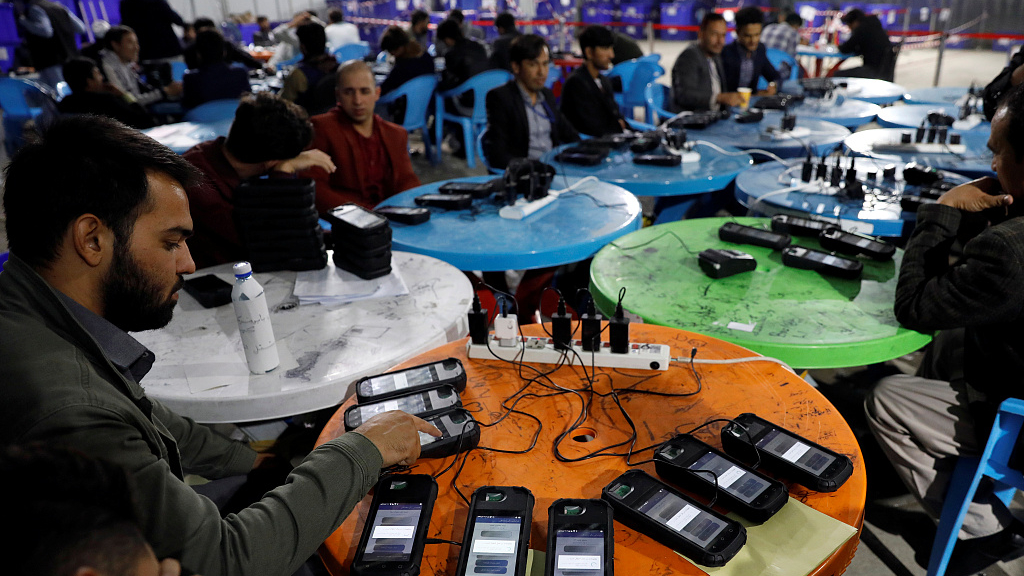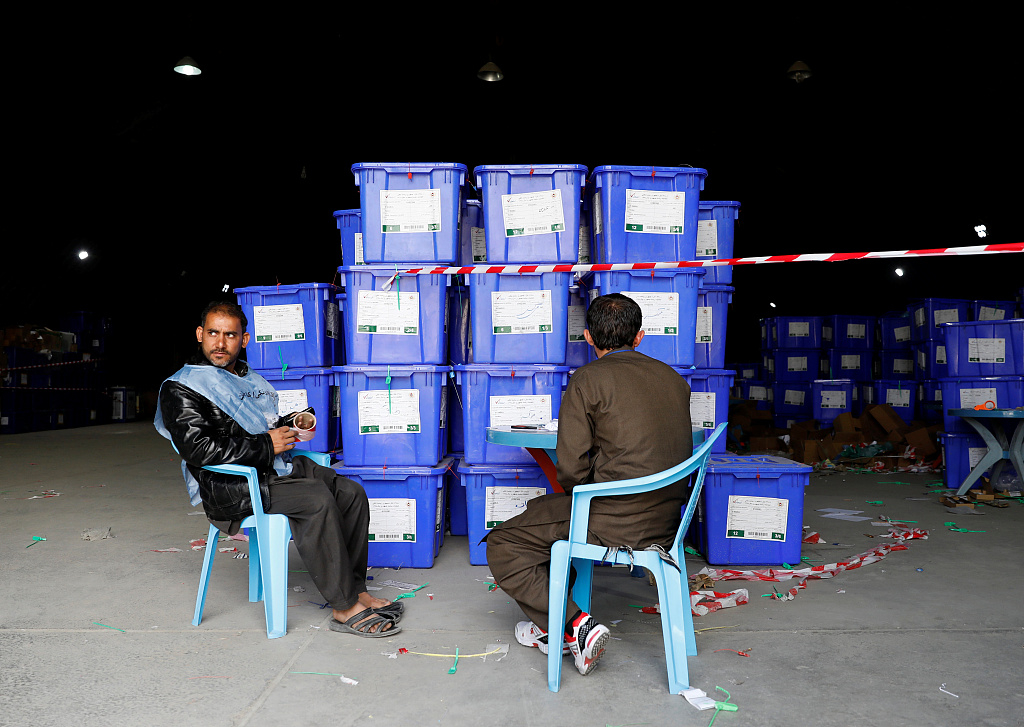
Afghan election commission workers transfer data from biometric devices to the main server at a warehouse in Kabul, Afghanistan October 7, 2019. /VCG Photo
Afghan election commission workers transfer data from biometric devices to the main server at a warehouse in Kabul, Afghanistan October 7, 2019. /VCG Photo
Editor's Note: Dr. Wang Jin is a research fellow of Charhar Institute in China and an associate Professor from Northwest University in China. The article reflects the author's opinions, and not necessarily the views of CGTN.
Over a month of waiting, the result of the Afghanistan election is still not released, though numerous Afghanistan already submitted their ballots on September 28. Due to an unsolved "technical delay," the results won't be released until November 14 which was previously scheduled for November 7. According to the Independent Election Commission (IEC), the data collected by the biometric voter verification (BVV) devices are still being processed.
It's also the first time that Afghanistan has used the BVV system to monitor the election process. The IEC's involvement came after a "boycott threat" in late July when the Council of Presidential Candidates issued a statement warning that they would boycott the election and warned against the possibility of it being influenced by fraud. They called for a transparent election with the assistance and monitoring of the Election Support Group, including the European Union, Australia, Sweden, Germany, Japan, the UK, and the U.S. In this case, it was highly necessary for IEC to use BVV, which uses fingerprints and eye and facial recognition, to verify the voters ensure a clean election.
However, the IEC's stance of insisting on the BVV devices faces a dilemma, if unverified votes are not counted, then the result might be influenced by the technical procedures, given that some BVV might have malfunctioned, especially in remote and mountainous voting areas, which would have left many disenfranchised. Yet, if the unverified votes are counted, it might open the door for the fraudulent votes being mixed with "clean" ballots, and eventually influence the fairness of the election overall.
Although there are 18 candidates competing for the presidency in this election, only three of them officially organized public campaign events, including the top two candidates: the incumbent president Ashraf Ghani and Chief Executive Abdullah Abdullah and a fringe candidate Enayatullah Hafiz. Although Ghani and Abdullah formed a unity government after 2014, their competition over the presidency came before the election.

Afghan election commission workers sit next to ballot boxes and election material at a warehouse in Kabul, Afghanistan October 7, 2019. /VCG Photo
Afghan election commission workers sit next to ballot boxes and election material at a warehouse in Kabul, Afghanistan October 7, 2019. /VCG Photo
For example, Ghani promised his supportors that he would put into practice of "Omarijustice," a reference to the second caliph of Islam and hope to attract Muslim voters, while Abdullah criticized Ghani and accused the president of double standards in fighting corruption. The third candidate Enayatullah Hafiz was only able to organize some events focused on the promotion the rights of minorities.
Although the commander of the U.S. and Resolute Support forces in Afghanistan, General Austin Miller, assured that the U.S. military forces would work with Afghan security forces "in all areas" to protect the election process, the security environment in Afghanistan still faces pressing challenges.
The Taliban threatened Afghan civilians against voting vote because the elections would only meet the demands of "a limited number of politicians, resulting in the waste of time, money and resources." Even the President Ghani had to reconsider the threats imposed from the Taliban so he stopped campaigning in some provinces and spoke to his supporters via video conferences instead.
Nonetheless, the biggest uncertainty of the election comes from the future of the government. The Taliban has been accusing the U.S. presence in Afghanistan as "occupation forces" and defining the Afghan government as "puppet government" controlled by Washington. The negotiations between the U.S. and the Taliban in Doha is underway and it is difficult for the U.S. to decide which is the priority – to maintain the government of Afghanistan, or to make peace with the Taliban through key concessions, especially through forming an interim government led by the Taliban.
Thus, it is still uncertain whether the future government resulted from this election will be able to maintain itself, or might it become a bargaining chip for the U.S. in the negotiation with the Taliban for the decent withdrawal from Afghanistan.
According to the U.S. ambassador to Afghanistan, John Bass, it is of "highest priority" to keep peace in Afghanistan. Not only the U.S. Secretary of State Mike Pompeo, but also Afghan President Ghani and other Afghan political leaders have expressed that peace is paramount for the region. Therefore, for the best of the people in the region and worldwide, it is highly important for all parties to work side by side towards the common goal of Afghan peace no matter what the election results end up being.
(If you want to contribute and have specific expertise, please contact us at opinions@cgtn.com.)